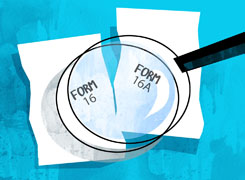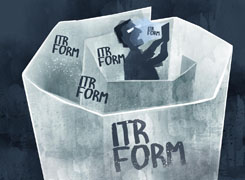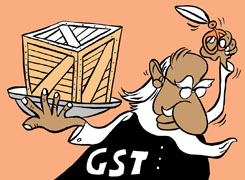Need Expert Advice?Our Gurus Can Help

Tejas Chokshi
Tax Expert
126 Answers | 23 FollowersFollow
He is an information system auditor, a forensic auditor and concurrent bank auditor.
Chokshi, who has a master’s degree in management, audit and accounting from Gujarat University, has completed his CA from the Institute of Chartered Accountants of India.... more
Answered on Sep 11, 2023

Answered on Sep 11, 2023

Tax Treatment of Intraday Trading Profits and Losses:
Profits: Profits made from intraday trading are considered as speculative business income in India. These profits are added to your total income and are taxed as per your applicable income tax slab rates.
Losses: Intraday trading losses can be treated in two ways:
Set Off Against Speculative Business Income: You can set off intraday trading losses against any other speculative income you have earned during the same financial year.
Carry Forward of Losses: If you are unable to set off the entire loss in a given financial year, you can carry forward the remaining loss for up to four assessment years. This can be adjusted against any speculative business income in those years.
Turnover Tax:
In India, there is no specific turnover tax on intraday trading. However, you may be subject to other charges and taxes, such as Securities Transaction Tax (STT), brokerage charges, and other regulatory fees.
Tax Audit:
In India, if your turnover from intraday trading exceeds a certain threshold, you may be required to get your accounts audited by a Chartered Accountant (CA) under Section 44AB of the Income Tax Act.
The limit is 1 cr for FY 2022-23. This limit may change over time.
Documentation and Compliance:
It's crucial to maintain proper records of all your intraday trading transactions, including contract notes, bank statements, and other relevant documents.
Ensure that you file your income tax returns accurately and disclose your speculative income, losses, and other financial details as required by the tax authorities.
Answered on Sep 11, 2023

if the issue does not gets resolved as above, file grievance and still it remains unresolved , file RTI
Answered on Sep 11, 2023

Answered on Sep 11, 2023

Answered on Sep 11, 2023

Answered on Sep 05, 2023
Answered on Aug 29, 2023
Answered on Aug 29, 2023
Answered on Aug 29, 2023
Answered on Aug 29, 2023
Answered on Aug 29, 2023
Answered on Aug 29, 2023

Answered on Aug 29, 2023

If the total of your interest income and dividend income exceeds the basic exemption limit, you may be required to file an income tax return. Even though you don't have active salary income, your other sources of income could still make you liable to pay tax.
Answered on Aug 29, 2023

Answered on Aug 29, 2023

Answered on Aug 14, 2023
Answered on Aug 14, 2023

The reply can be framed after all the above information is received.
Answered on Aug 07, 2023
Answered on Aug 07, 2023

The actual amount of leave encashment received.
The amount specified by the government (Rs. 3 lakhs in this case, as you mentioned).
The average salary of the last 10 months preceding retirement, multiplied by the number of days of earned leave at the credit of the employee at the time of retirement, divided by 30.
If your employer has not mentioned this exemption in your Form 16, it could be an administrative oversight. It's generally the responsibility of the employer to correctly calculate and mention such exemptions in the Form 16.
In case your Form 16 does not include the correct exemption for leave encashment and you are eligible for the exemption, you should contact your employer to rectify the Form 16
Answered on Aug 07, 2023
Answered on Aug 07, 2023

Answered on Aug 07, 2023

Your grandson claiming HRA (House Rent Allowance) for the rent he's paying you might raise concerns if the property is not legally rentable. HRA is usually claimed when an individual pays rent to a landlord other than a close relative. Since you are his grandmother, the relationship might fall under the category of a close relative.
Answered on Aug 07, 2023

Answered on Aug 07, 2023

Answered on Aug 07, 2023

The tax on long-term capital gains is usually 20% (plus applicable surcharge and cess) after considering any exemptions or deductions available under Section 54 or Section 54F if you are not investing in another property or capital gains bonds.
To close the transaction and fulfill your tax obligations, you should consider the following steps:
a. Calculate Capital Gains: As explained above, calculate the capital gains based on the indexed purchase price and selling price.
b. Pay Capital Gains Tax: If you decide not to invest in another property or capital gains bonds, you will need to pay the applicable capital gains tax. You can do this by filling out the appropriate sections in your income tax return and paying the tax amount.
c. File Income Tax Return: Ensure that you accurately report the capital gains in your income tax return for the assessment year.
d. Keep Documentation: Maintain all relevant documents related to the property sale, purchase, and tax calculations for future reference
Answered on Jul 25, 2023

Answered on Jul 25, 2023

Answered on Jul 25, 2023

Answered on Jul 25, 2023
Answered on Jul 25, 2023

Answered on Jul 25, 2023
Answered on Jul 25, 2023

you may inform department about the demise and apply to cancel her pan card.
Answered on Jul 25, 2023
Answered on Jul 25, 2023

Answered on Jul 25, 2023

Answered on Jul 22, 2023

Answered on Jul 22, 2023

Answered on Jul 22, 2023

Apart from Sec 80 C and 80 D, deductions can be availed by investing in National pension schemes of additional Rs. 50,000, deduction of saving bank account interest is available under Sec 80TTA and housing loan interest if loan is availed to buy a house , for upto Rs. 2.00 lacs . These are apart from other deductions, which you may be able to claim.
Answered on Jul 22, 2023
Answered on Jul 22, 2023

you may file either ITR- 1 or ITR-2 depending on the complexity of the income. Yes, the lock in period of 3 years applies on ELSS schemes and if withdrawn before that it would attract taxability. Please look at the below a detailed note, which would be helpful to you. Withdrawal from Tax Saver Mutual Fund: If you made a withdrawal of Rs. 65,000 from your tax saver mutual fund, it's important to note that withdrawals from equity-linked saving schemes (ELSS) are subject to tax implications.
- ELSS investments have a lock-in period of three years. Withdrawals made before the completion of the lock-in period are considered as short-term capital gains.
ITR Form: Since you are a teacher by profession, your income is likely from salary and other sources. If you do not have any business income, you would typically file your income tax return using ITR-1 (Sahaj) or ITR-2, depending on the complexity of your income sources.
ITR-1 (Sahaj): For individuals having income from salary, one house property, other sources (like interest income), and total income up to Rs. 50 lakh.
ITR-2: For individuals and Hindu Undivided Families (HUFs) not eligible to file ITR-1 and having income from salary, house property, capital gains, and more than one house property, etc.
Answered on Jul 22, 2023

However, there were certain benefits available for homebuyers under the Income Tax Act that could potentially help reduce their tax liability. These benefits were in the form of deductions and exemptions related to home loans, interest payments, and principal repayments
Answered on Jul 22, 2023
Answered on Jul 22, 2023

The authorities may direct to take suitable alterations in this regards to the concern.
Answered on Jul 22, 2023

- You can claim exemption on the capital gains if you invest the entire amount of capital gains in a new residential property. In your case, the total capital gain is Rs. 15.00 lakh, and you have utilized Rs. 9.00 lakh to purchase the residential plot. To claim the exemption, you must utilize the entire Rs. 15.00 lakh amount for the construction of the new house.
- If you are unable to invest the entire capital gains amount before the due date of filing your income tax return (usually July 31st of the assessment year), you can deposit the unutilized amount in a Capital Gain Account Scheme (CGAS) before the due date to claim the exemption. In your case, if you haven't utilized the entire Rs. 15.00 lakh for purchasing the residential plot and construction has not yet begun, you must deposit the unutilized amount of Rs. 6.00 lakh in the CGAS.
- In your Income Tax Return for AY 2023-2024, you need to show the capital gains from the sale of the residential property, which is Rs. 15.00 lakh, and then claim the exemption under Section 54F for the amount utilized to purchase the residential plot and construct the new house (i.e., Rs. 9.00 lakh). Additionally, you should mention that the remaining Rs. 6.00 lakh is deposited in the CGAS for the purpose of constructing the new house to claim the complete exemption.
Please note that to avail of the exemption under Section 54F, you need to fulfill all the conditions mentioned in the section, such as not owning more than one residential house (excluding the new one) on the date of transfer of the original property and not purchasing any other residential property within a specified time frame.
Answered on Jul 21, 2023

Answered on Jul 21, 2023

Answered on Jul 15, 2023

Scholarship Programs: Research and apply for scholarship programs specifically designed for students pursuing higher education. These programs often provide financial assistance to deserving students based on their academic performance, financial need, or other criteria.
Non-Profit Organizations: There are several non-profit organizations, foundations, and trusts that provide financial aid and scholarships to students in need. Look for organizations that support education and inquire about their scholarship or grant programs.
Corporate Sponsorships: Some companies offer scholarships or sponsorships for deserving students under the applicable CSR schemes applicable as per the present companies act. Research companies in your area or within your field of work and check if they have any educational support programs.
Government Schemes: Inquire about government-sponsored scholarship programs or educational grants available for students from economically weaker sections. Contact the relevant government departments or education authorities for information and assistance.
Crowdfunding Platforms: Consider utilizing crowdfunding platforms that allow individuals to create campaigns and raise funds for specific causes. You can create a campaign highlighting your daughter's educational aspirations and financial constraints, and share it with friends, family, and social networks to seek support.
Local Community Support: Reach out to community organizations, local charities, religious institutions, or social welfare groups in your area. They may have programs or funds dedicated to supporting students in need.
When seeking educational fund donations, it is important to present your case with honesty, transparency, and authenticity. Explain your situation and provide relevant documentation to support your request. Additionally, make sure to follow any guidelines or application procedures specified by the organizations or programs you approach.
Remember, it's always advisable to conduct thorough research, be cautious of potential scams, and verify the credibility of any organization or program before sharing personal or financial information.
I wish you the best of luck in finding the necessary support to help your daughter continue her education!
Answered on Jul 15, 2023

Senior Citizen Savings Scheme (SCSS): This government-backed scheme is specifically designed for senior citizens and offers attractive interest rates. Investments in SCSS are eligible for tax deductions under Section 80C of the Income Tax Act, up to a maximum limit of Rs. 1.5 lakh per financial year.
Pradhan Mantri Vaya Vandana Yojana (PMVVY): This scheme is offered by Life Insurance Corporation of India (LIC) and provides regular pension income to senior citizens. It offers a higher interest rate than other fixed-income instruments. PMVVY offers tax benefits on the pension received, and the investment amount is eligible for tax deductions under Section 80C.
Tax-saving Fixed Deposits (FDs): Many banks offer tax-saving FDs with a lock-in period of five years. The interest earned is taxable, but the investment amount is eligible for tax deductions under Section 80C.
National Savings Certificates (NSC): NSCs are issued by the Indian government and offer a fixed interest rate. The interest accrued is eligible for tax deductions under Section 80C. However, the interest earned is taxable.
Tax-saving Mutual Funds (ELSS): Equity Linked Saving Schemes (ELSS) are diversified mutual funds that invest primarily in equities. They offer the potential for higher returns over the long term. ELSS investments are eligible for tax deductions under Section 80C, up to a maximum limit of Rs. 1.5 lakh per financial year. However, please note that ELSS investments are subject to market risks.
It is important to consider your risk appetite, financial goals, and investment horizon before making any investment decisions. I would recommend consulting with a financial advisor who can assess your specific circumstances and provide personalized investment advice based on your needs.
Answered on Jul 05, 2023














